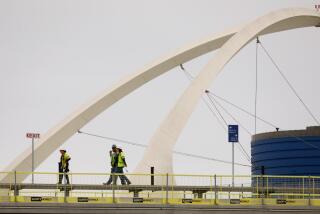FAA Backs Chicago Plan for O’Hare Airport Expansion
- Share via
CHICAGO — The Federal Aviation Administration said Thursday that it supported Chicago’s $15-billion master plan to expand O’Hare International Airport in an effort to reduce some of the nation’s worst flight delays.
In its environmental impact report, the agency said it had considered a number of proposals, including ones that called for adding runways, modifying existing ones, or leaving O’Hare alone and instead spending the money on building a third airport in the region.
Federal officials, who have been studying the matter since 2002, decided that the city’s solution was the best way to decrease airport congestion while doing the least amount of damage to the area’s water and air quality.
Calling O’Hare “the engine of the region’s economy,” Chicago Mayor Richard M. Daley said Thursday that the airport expansion would begin after the FAA issued its final ruling. That is expected at the end of September, following a period of public comment.
The first new runway would open in 2007, with the entire project completed by 2013.
“When we reduce delays at O’Hare, it will speed up air travel throughout the nation, saving millions of dollars in time and fuel,” Daley said at a news conference.
The long-running debate over how to relieve congestion at O’Hare peaked last year when delays reached an all-time high. At the time, federal officials pressured the airlines to temporarily reduce their schedules from as many as 110 arrivals an hour to 88 during peak times.
The airport, the world’s second-busiest, is a hub for United Airlines and American Airlines. A delay in Chicago can cause ripples across the country, FAA officials said.
Opponents said Chicago had underestimated how much the project would cost and had overstated its benefits. They vowed to keep fighting the planned construction.
“There is no question that we’ll file a lawsuit to block this,” said Craig B. Johnson, mayor of Elk Grove Village, Ill. Elk Grove and other suburbs that are in the path of the expansion plan are trying to prevent dozens of businesses and hundreds of houses from being knocked down.
“The problem with the FAA’s report,” Johnson said, “is they don’t answer some very critical questions, such as ‘How are you going to fund all this?’ ”
Chicago officials have said $6.6 billion of the project’s total budget would go toward building runways, overhauling existing ones and adding a terminal to the airport’s western side.
But a report written this month by the U.S. Department of Transportation’s inspector general, Kenneth M. Mead, criticized the city’s funding plan.
Mead’s report said the $6.6-billion portion of the project, according to some city documents, could run as high as $8 billion. It said Chicago had no guarantees that it would be able to obtain federal grants and flight taxes needed to help pay for the expansion.
Opponents also have said the expansion would violate the rights of a local church.
St. Johannes Cemetery, a 155-year-old graveyard, abuts the airport and is separated from O’Hare’s tarmac by an electric fence.
The city has hired a company to relocate the estimated 1,600 graves to an unspecified location.
Several parishioners of St. John’s United Church of Christ, which manages St. Johannes, have filed a lawsuit to block the relocation, claiming that removing the bodies is a violation of the families’ religious practices.
More to Read
Sign up for Essential California
The most important California stories and recommendations in your inbox every morning.
You may occasionally receive promotional content from the Los Angeles Times.










